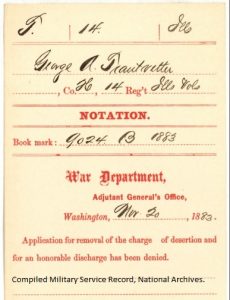It’s atypical for a Union veteran of the Civil War (or his widow) to not receive a military pension if he or his widow qualified for one.
Pensions that can’t be found create the same questions in a genealogists mind when any expected record can’t be located:
- am I looking in the wrong way?
- am I looking in the wrong place?
- is it filed improperly?
- is the name spelled so that I can’t find it?
- was a record even created in the first place?
It is that last question that can be the stumbling block and renders the previous questions moot.
 Such was the case with George A. Trautvetter.
Such was the case with George A. Trautvetter.
Early in my research, I failed to locate a pension for him. I did not give it much thought at the time. The family was (so I thought) well-documented during their post-1853 immigration to Illinois from Germany and I had their Germanic origins, including the village of birth for George and his immigrant parents. The pension file wasn’t probably going to help me and so I didn’t concern myself with why I couldn’t find one.
After all, Trautvetter gets spelled 1,230, 023 ways. I probably was not using the spelling the military had used.
I did not bother to get George’s compiled military service record either.
Turns out spellings were not the problem. If I had obtained the compiled service record, I would have discovered the likely reason he had no pension record:
he deserted
There’s a little more to it than that which we will see in a future blog post.
Astute readers will know that there’s actually an index to Civil War pensions that is not organized by name. It’s organized by unit. Not finding him in that index would have indicated that the spelling of his name was not the problem. That index is actually called the “Organization Index to Pension Files of Veterans Who Served Between 1861 and 1900” (NARA microfilm publication T289).
Melissa Smith says:
All of the Civil War ancestors that I found did have pensions, but this was an interesting read. Thanks!
Jade says:
Congress passed legislation in the 1890s that forgave some classes of Union deserters. Some men took advantage of this and were able to apply for pensions based on their service.
mjnrootdig says:
And it is also worth noting that desertion during the American Civil War was viewed differently than it is today. I’ll have to see what the details were of the 1890-era legislation. This person lived well into the 20th century and there may have been something about his desertion that did not meet the terms of the act. Thanks.
Jade says:
Sorry, typographical error on my part. Your upload of George A. Trautvetter’s CMSR refers to it in one document, application for removal of charge of desertion, dated 1883, not 1893.
t says:
Sometimes they had to get home for planting or harvest or for a serious illness in the family. Times were different then.
frank Burke says:
It is possible that he was in a hospital, sick or wounded, and this information was not relayed to his unit.
mjnrootdig says:
This is true. There were Civil War soldiers who went “home” to recover from illness or injuries. That wasn’t the case with George, but for others it was.
Laura G Adams says:
Maybe I am not astute! Where is that index you speak of, the one of all the soldiers from 1861 to 1900.
Appreciate your help!
mjnrootdig says:
The “unit index” is online at Fold3.com–you can browse at no charge, but you have to know the unit. You can see enough of the card without a membership to know if your guy got a pension or not.
https://www.fold3.com/browse/249/hh_q9kMjO